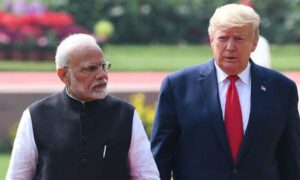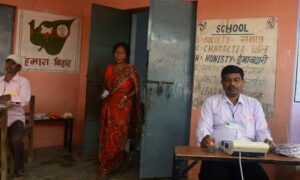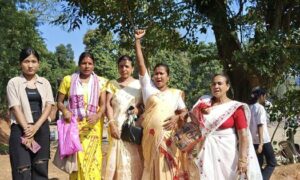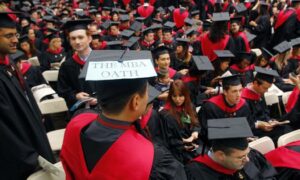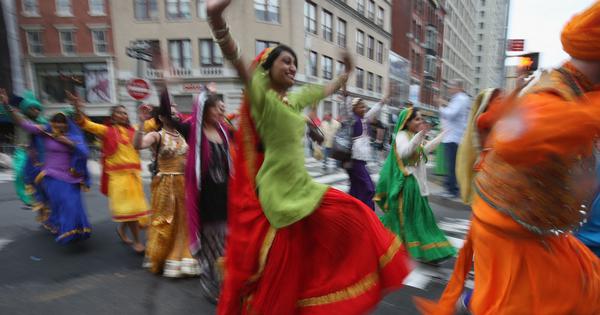
A new study tracking two decades of Indian-American political campaign donations in the United States has found that the community overwhelmingly supports Democratic party candidates, giving them roughly three times more funding than Republicans.
The research by Karnav Popat and Vishnu Prakash of Ashoka University and Joyojeet Pal of the University of Michigan shows Indian-Americans contributed $46.6 million to Democrats as opposed to $16.3 million to Republicans in the 2020 US Presidential election cycle.
The data shows that Indian-American donors in all major industry sectors, with even traditionally conservative fields like finance, supported the Democrats
“Trump’s tariffs on India may be partially explained by the Indian-American community’s minimal financial support for Trump,” said lead researcher Joyojeet Pal in a social media post about the study.
US President Donald Trump imposed 50% tariffs on India last month, his harshest trade penalties on any major economy. The research found Indian-Americans gave Trump just 0.6% of their political donations in 2016, among his weakest support from any ethnic group. The study did not encompass the donations in the run-up to the 2024 US Presidential elections.
The researchers analysed campaign donation records from OpenSecrets, a nonprofit that compiles Federal Election Commission data on all political contributions, examining 22 years of filings from 2000 to 2022. Since donor records include names and addresses but no ethnicity information, the team developed a system to identify Indian-American donors by their names.
They used a database of nearly 39 million names from Facebook data to determine which names are significantly more common in India than the United States. However, they excluded donors with Muslim names like Khan because these appear frequently across several countries, making it impossible to confirm Indian origin.
The study likely undercounts Indian-American Muslims and Christians with anglicised names, but the researchers manually verified all major contributors to ensure accuracy of the overall funding patterns.
Trump’s tariffs on India may be partly explained by who funds his politics. Our study of two decades of Indian American lobbying in the US shows a strong, consistent Democrat lean, with Trump-1 scoring among the lowest ever share from Indian Americans (1/n) pic.twitter.com/w8vVmUG3Gz
— joyojeet pal (@joyopal) September 8, 2025
The research showed how the Indian American community has grown as a political force in the country. From 2000 to 2023, the population of the community surged by over 150%, growing from 1.9 million to more than 4.9 million, making them the largest Asian-American subgroup.
This demographic expansion has been accompanied by increasing affluence, with Indian-Americans boasting a median household income of $145,000 and 80% holding bachelor’s degrees or higher, according to Pew Research Center data from 2024.
The community increased political donations by 550% over two decades, from roughly 6,700 contributors in 2000 to more than 43,000 in 2020. All six Indian-Americans currently serving in Congress are Democrats.
However, despite representing 1.5% of the U.S. population, Indian-Americans contribute only about 1% of total campaign funding, suggesting the community donates below what their demographic weight might indicate.
Healthcare professionals, including over 3,600 physicians, comprise the largest donor group by numbers and dominate contributions in 42 states. But finance professionals wield outsized influence through larger individual donations, contributing $24.8 million in 2020 compared to healthcare’s $20.2 million. Technology workers contributed $7.4 million despite Silicon Valley’s reputation as an Indian-American stronghold.
Much of the community’s political influence operates through “bundlers” – well-connected individuals who organise fundraising events rather than making large personal donations themselves. These fundraisers can raise millions through single events while requiring candidates to do little more than attend brief meet-and-greets.
Prominent bundlers include venture capitalist Ramesh Kapur and former Surgeon General Vivek Murthy, who organise high-dollar fundraising events for Democratic candidates. The study notes that in 2020, Indian-Americans comprised 3% of Joe Biden’s bundlers.
Political launchpad
The study also found that Indian-American candidates use their community as a political launchpad. Ro Khanna raised 80% of early campaign funds from Indian-American donors. Congressional hopeful Suraj Patel raised $5.5 million largely from donors sharing his surname, reflecting caste networks. However, successful candidates gradually diversify their funding base once they are established in American politics.
Indian-Americans in California alone contributed $34.3 million in 2020, with finance professionals in the state giving over $10 million. New York and New Jersey round out the top three states, together accounting for the majority of Indian-American political funding.
Indian-Americans are heavily represented in these states’ key industries: technology in California, finance in New York, and healthcare across all major metropolitan areas.
While most Indian-Americans are Hindu, their voting patterns diverge from Hindu nationalist politics in India. “The policy positions of Indian-Americans, particularly prominent Indian-American political figures, are often very distinct from conventional Hindu political talking points,” the study notes.
However, some wealthy Hindu Americans break from this pattern. Harshad Patel, who heads the Gujarati Samaj of New York, held a private fundraiser for mayor Eric Adams earlier this year and opposed Democratic socialist and Indian-origin candidate Zohran Mamdani for his criticism of Prime Minister Narendra Modi’s policies.
Other Hindutva-supporting groups in the US are mobilising funds for Andrew Cuomo, who is also running for New York mayor against Mamdani.
📰 Crime Today News is proudly sponsored by DRYFRUIT & CO – A Brand by eFabby Global LLC
Design & Developed by Yes Mom Hosting



